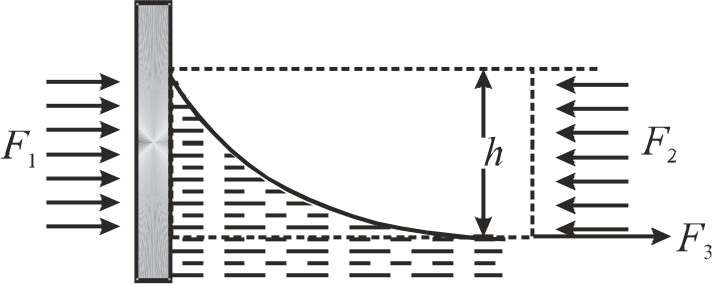What is the difference between 2.0m and 2.00m.
(P0+ρgh2)lh
(P0−ρgh2)lh
(P0−ρgh)lh
P0lh
The pressure of the water changes linearly with the increase in height. At the bottom of the meniscus it is equal to the external atmospheric pressure p0, and at the top to . The average pressure exerted on the wall is Paverage=p0−ρgh/2. The force corresponding to this value, for an aquarium with side walls of length l, isF1=paveragelh. Consider the horizontal forces acting on the volume of water enclosed by the dashed lines in the figure. The wall pushes it to the right with force F1, the external air pushes it to the left with force F2π0lh, and the surface tension of the rest of the water pulls it to the right with a force F3=ls. The resultant of these forces has to be zero, since the volume itself is at rest. This means that

(ρ0−12ρgh)lh−p0lh+ls=0
which we can writen as
h=√2sρg=√2×0.0731000×10=0.0038m
Water rises by approximately 4 mm up the wall of the aquarium,
(ρ0−12ρgh)lh−p0lh+ls=0 which we can writen as
h=√2sρg=√2×0.0731000×10=0.0038m
Topper's Solved these Questions
Similar Questions
What is the difference in height between a point 270 m above sea level and 80 m below sea level ?
View SolutionTwo sinusoidal waves in a string are defined by the function y1=(2.00cm)sin(20.0x−32.0t) and y2=(2.00cm)sin(25.0x−40.0t) where y1,y2 and x are in centimetres and t is in seconds.
(a). What is the phase difference between these two waves at the point x=5.00cm at t=2.00s?
(b) what is the positive x value closest to the original for which the two phase differ by +πatt=2.00s? (That os a location where the two waves add to zero.)
View Solution
Knowledge Check
The position of an object moving along x-axis is given by x=a+bt2, where a=8.5m and b=2.5 ms^(-2) and (t) is measured in seconds. What is the velocity at t=1= 0sandt=2.0 s? What is the average velocity between t=2.0s and t=4.0s? a) 5 m/s b) 10 m/s c) 15 m/s d) 20 m/s
A5ms−1B10ms−1C15ms−1D20ms−1
Two points are located at a distance of 10m and 15m from the source of oscillation. The period of oscillation is 0.05s and the velocity of the wave is 300m/s. What is the phase difference between the oscillation of two points?
View Solution0.1 M formic acid solution is titrated against 0.1 M NaOH solution. What would be the difference in pH between 1/5 and 4/5 stages of neutralization of acid?
View Solution0.1 M acetic acid solution is titrated against 0.1M NaOH solution. What would be the difference in pH between 14 and 34 stages of neutralisation of acid ?
View SolutionWhat is the difference in pH for 1/3 and 2/3 stages of neutralization of 0.1MCH3COOH with 0.1MNaOH?
View SolutionGive the difference between e.m.f. and potential difference.
View SolutionFind the potential difference VAB between A(2m,1m,0) and B(0,2m,4m) in an electric field,
E=(xˆi−2yˆj+zˆk)Vm
View SolutionIf the difference between the circumference and radius of a circle is 37 cm, then its area is (a) 154 cm2 (b) 160 cm2 (c) 200 cm2 (d) 150 cm2
View Solution
